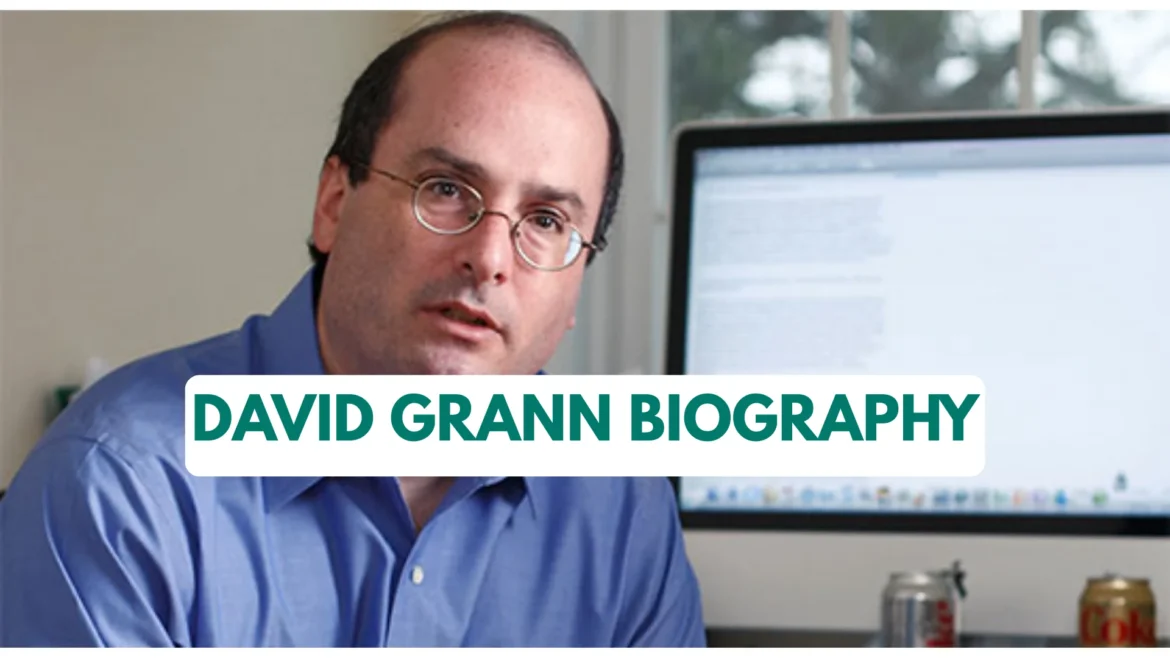David Grann is one of the most influential narrative nonfiction writers working today. A staff writer for The New Yorker and the author of multiple New York Times bestsellers, Grann has turned meticulous investigative reporting into long-form books and essays that blend history, crime, adventure, and moral inquiry.
His books — including The Lost City of Z, Killers of the Flower Moon, and The Wager — have shaped public conversations, inspired film adaptations, and helped revive interest in neglected historical episodes.
Bio Data
- Full Name: David Elliot Grann
- Born: March 10, 1967
- Age: ~58 (as of 2025)
- Birthplace: New York, United States
- Nationality: American
- Occupation: Journalist, Author, Staff writer at The New Yorker
- Parents: Phyllis E. Grann (mother), Victor Grann (father)
- Siblings: Edward Grann, Alison Grann
- Spouse: Kyra Darnton
- Children: 2
- Net Worth: Estimated ~$5 million
Early life and education
David Elliot Grann was born in New York in 1967 and raised in Connecticut. He comes from a family closely connected to publishing and medicine: his mother was a publishing executive and his father an oncologist. Grann studied government at Connecticut College, received a Thomas J. Watson Fellowship that enabled international research early in his career, and later earned graduate degrees — including a master’s in international relations from Tufts and an MFA in creative writing from Boston University. These educational experiences, plus early international work, shaped the curiosity and rigorous reporting style that define his career.
Career beginnings and rise to prominence
Grann began as a journalist in the 1990s, working as an editor and reporter before joining The New Yorker as a staff writer in 2003. His magazine pieces, known for deep archival research and immersive reporting, were regularly anthologized in “Best American” collections and brought him a wide readership. Over time he transitioned his long-form reporting into narrative books that reach both academic and mainstream audiences.
Major works and themes
- The Lost City of Z (2009) — A hybrid of biography, history, and adventure that reexamines British explorer Percy Fawcett’s quest for an Amazonian city and explores broader questions of obsession, colonialism, and discovery. The book began as a magazine piece and later became an international bestseller; it was adapted into a feature film.
- The Devil and Sherlock Holmes (2010) — A collection of Grann’s standout magazine pieces that showcase his range: true crime, odd historical mysteries, and investigative narratives.
- Killers of the Flower Moon (2017) — A meticulous investigation into the systematic murders of Osage Nation members in 1920s Oklahoma after oil discoveries. The book was a bestseller, earned critical praise, and was adapted into a major film that brought renewed attention to the history it chronicles. Its reach has prompted public debate about how history is taught and remembered.
- The Wager (2023) — A narrative of shipwreck, mutiny, and imperial intrigue that continued Grann’s interest in moral complexity, survival, and institutional failure. Like his earlier books, it combines archival sleuthing with compelling storytelling.
Across these works Grann returns to recurring themes: the hazards of obsession, institutional power and corruption, the interplay of myth and evidence, and the moral responsibilities of telling other people’s stories.
Style and approach
Grann’s hallmark is an exhaustive, evidence-first method married to classical storytelling. He blends primary-source research, archival documents, interviews, and on-the-ground reporting into a narrative arc often structured like a detective novel. Readers and critics praise his ability to make complex historical or forensic detail feel immediate and suspenseful without sacrificing scholarly rigor.
Awards and recognition
Grann’s journalism and books have earned him major awards and nominations. He has received the George Polk Award and other honors; his books have been finalists for prestigious prizes and frequently appear on bestseller lists. He’s also had multiple works adapted for film, exposing his reporting to much wider audiences.
Impact and controversies
Because Grann tackles difficult chapters of history — often involving race, colonialism, and systemic violence — his books sometimes spark debate over interpretation, responsibility, and adaptation. The cinematic adaptations of his work have amplified those discussions, prompting thoughtful criticism about historical framing and narrative emphasis, and bringing survivors’ and descendants’ voices into the public eye. Grann has emphasized the importance of historical truth and collaboration with affected communities in public conversations about his books.
Personal life
Grann lives with his family and divides his time between journalism and long-form book projects. Despite his public profile, he keeps a relatively private personal life, focusing public attention on the stories he tells rather than on himself.
Why David Grann matters
In a media landscape that often privileges speed over depth, Grann exemplifies the continuing value of patient, narrative investigative reporting. His books have revived forgotten histories, held institutions to account, and elevated the craft of narrative nonfiction. Whether you’re a reader of history, true crime, or literary journalism, Grann’s work offers thorough research presented with narrative drive and moral seriousness.
Frequently Asked Questions (FAQs)
When and where was David Grann born?
David Elliot Grann was born in New York in 1967 and raised in Connecticut.
What is David Grann best known for?
He is best known as a staff writer for The New Yorker and for bestselling books such as The Lost City of Z and Killers of the Flower Moon.
Have any of his books been adapted into films?
Yes. The Lost City of Z was adapted into a feature film, and Killers of the Flower Moon was adapted into a major motion picture, among other adaptations of his articles.
What awards has he received?
Grann has received honors including the George Polk Award and other literary and journalistic accolades; several of his books have been finalists for major awards.
What themes does Grann explore?
He frequently explores obsession, institutional failure, hidden histories, and moral complexity, using investigative methods to reconstruct events and their human consequences.
Conclusion
David Grann has become a touchstone figure for contemporary narrative nonfiction. Through comprehensive reporting, compelling narrative craft, and a willingness to tackle morally and historically fraught topics, he has brought forgotten or obscured stories to broad readerships and public discourse. Whether you’re encountering his work for the first time or returning to it, Grann’s books reward patience, curiosity, and attention — and invite readers to interrogate both the past and the act of storytelling itself.




